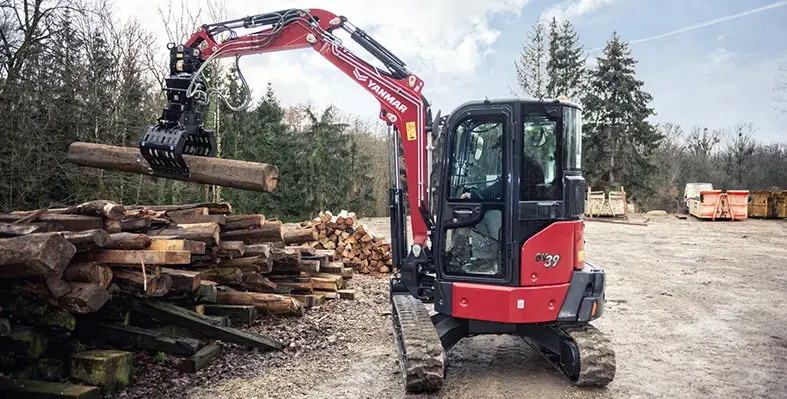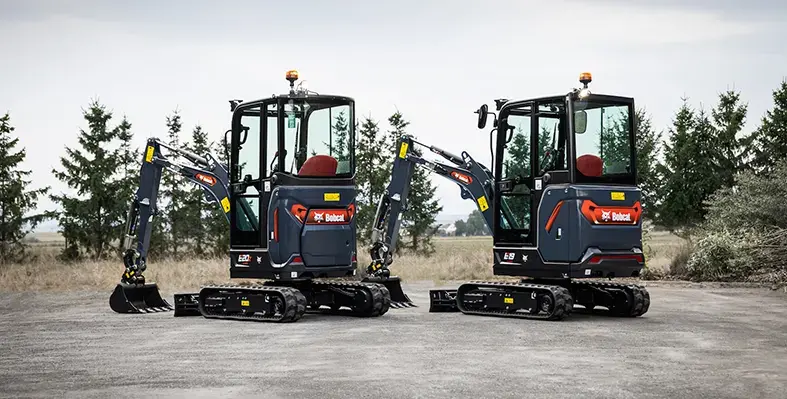Construction
Bobcat unveils limited-edition mini excavators
To celebrate the start of production for its new R2-Series 1-2 tonne mini excavators, Bobcat is releasing a special, limited-edition run of its top models
Only 50 of these exclusive Premiere Launch Edition machines will be produced for the Africa, Middle East and Europe markets, making them a rare and highly collectible piece of equipment.
The latest generation R2-Series comprises the new E16, E17z, E19 and E20z models, first previewed at the Bauma show in Germany earlier this year.
The exclusive limited-edition version will be available for the top-of-the-range models of the 1-2 tonne range: the E19 and the E20z. Only 25 units of each will be produced.
“We are launching the Premiere Launch Edition to promote the new range and to emphasise our market presence at the time of the start of production for the new machines,” said Miroslav Konas, product line manager for Doosan Bobcat EMEA.
The first deliveries of both the regular and Premiere Launch Edition machines will begin in September.
The special features offered by the Premiere Launch Edition include:
Exclusive charcoal grey colour; Premium red and black cloth or leather seat cover designed by MAD for demanding users of luxury, sports and classic cars; Individually numbered plate in the cab; Aluminium pedals; 4 high-value aftermarket kits as standard; Direct Return to Tank; Top Guard Cab; Travel Motor Hose Guard; Bucket Cylinder Cover.
The E16, E17z, E19 and E20z new generation R2-Series 1-2 tonne mini excavators replace the previous M-Series E17, E17z, E19 and E20z machines, respectively and offer a fresh look, signifying new levels of performance and features designed to meet all the variations found across the EMEA market.
“The Premiere Launch Edition is a strong conversation starter and sales tool and gives dealers an opportunity to offer customers a truly unique, high-spec machine that is both visually distinctive and technically enhanced,” said Konas.
“The non-standard colour and editional branding help increase awareness and generate buzz and it serves to show that the new generation mini excavators are not just an update, they are a bold step forward.”
Read more:
Yanmar launches SV39 mini excavator with unmatched stability
New generation Volvo excavators stand out
Bobcat will redefine excavation at bauma 2025
Lafarge Africa launches EcoCrete low-carbon concrete

Lafarge Africa introduces EcoCrete, Nigeria’s first low-carbon Ready-Mix concrete, advancing sustainable construction goals. (Image source: Lafarge Africa)
Lafarge Africa Plc, a leading provider of sustainable and innovative building solutions known for producing high-quality cement, has introduced a new product to the Nigerian market, EcoCrete, the country’s first low-carbon Ready-Mix concrete
EcoCrete achieves at least a 20% reduction in CO₂ emissions compared to traditional CEM I concrete, while maintaining the same level of performance and reliability. The company’s Abuja Ready-Mix (RMX) facility has been fully converted to 100% EcoCrete production, representing the first stage of this pioneering launch.
According to the group managing director/CEO of Lafarge Africa Plc, Lolu Alade-Akinyemi, the introduction of EcoCrete enhances the company’s range of sustainable solutions, strengthening its pledge to decarbonise Nigeria’s construction industry.
Alade-Akinyemi noted that the launch underscores the company’s drive to provide innovative offerings that help customers build better with fewer resources.
“The introduction of EcoCrete is another bold step in our mission to enable builders and our customers make smart choices and support Nigeria’s transition to a greener economy. Just like our ECOPlanet cement, EcoCrete represents a game-changing innovation that combines performance with reduced carbon footprint,” stated Alade-Akinyemi.
Highlighting the advantages of the new solution, Derek Williamson, head of aggregates and readymix at Lafarge Africa Plc, said EcoCrete guarantees excellent performance across multiple uses, including housing projects, commercial structures, roads, and bridges.
Williamson emphasised that the rollout of EcoCrete would empower contractors, engineers, and architects to achieve sustainability targets without compromising essential qualities such as durability, workability, or strength.
“EcoCrete provides superior performance while significantly reducing carbon emissions in the environment. It is versatile and reliable for a wide range of applications from residential housing to commercial and infrastructure projects. With EcoCrete, builders and developers can now make environmentally conscious choices without compromising on strength, durability, or workability,” he added.
Emmanuel Ilaboya, head of innovation and new product development at Lafarge Africa Plc, remarked, “EcoCrete is more than just a product; it is a climate-smart innovation designed to address the urgent need for sustainable construction. EcoCrete represents an innovative concrete solution developed through extensive research and testing. With EcoCrete, we provide a scalable alternative that significantly lowers CO₂ emissions and supports Nigeria’s path towards sustainable development,” he added.
The launch of EcoCrete follows the earlier success of EcoPlanet Unicem and EcoPlanet Elephant cement, which were released in 2024 and 2025 respectively, as part of the company’s broader mission to expand sustainable alternatives across its product lines.
With this latest innovation, Lafarge Africa continues to shape Nigeria’s construction sector by delivering low-carbon, forward-looking solutions in line with Holcim’s global vision of building progress for both people and the planet.
Hamm launches new compact tandem rollers: HD 10–HD 12 G-Tier

Hamm expands its HD CompactLine with HD 10–12 G-Tier rollers, offering agile performance and Stage V compliance. (Image source: Hamm)
Roller manufacturer Hamm has introduced its latest compact tandem rollers – the HD 10–HD 12 G-Tier models. Weighing between 2.5 and 2.7 metric tonnes, the HD 10 G VV and HD 12 G VV variants are currently available in France, with other markets set to follow.
Both models meet EU Stage V exhaust emission standards, making them suitable for road and pathway construction as well as gardening and landscaping. These compact machines are particularly effective on tight, inner-city construction sites, where space is at a premium.
Compact, clear, and agile
The new tandem rollers in the HD CompactLine range stand out due to their compact design, user-friendly handling, and strong compaction performance. Thanks to their 3-point articulation, they offer excellent maneuverability, consistent weight distribution across both axles, and improved safety. This design ensures stable driving, high resistance to overturning while cornering, and smooth asphalt surfaces without undulations. Additionally, the large drum diameter contributes to high-quality compaction by helping to prevent uneven material distribution.
Perfectly equipped for rental
Designed with the rental market in mind, both models boast intuitive controls, making them easy to operate even for less experienced drivers. The ergonomically optimized cab offers excellent visibility, and the adjustable driver's seat can be tailored to any operator’s size and weight. Maintenance is also simple, with all service points easily accessible, especially around the 18.2 kW Yanmar engine. As with the rest of the HD CompactLine, these machines are easy to transport, thanks to multiple tie-down points and a central suspension point for quick and easy loading. These features make the new rollers a strong fit for the rental industry.
Options for a clearer overview and lower emissions
A range of configuration options is available for these models, including “powerful LED work lighting, an anti-freeze filling system, a back-up alarm and even the option of connecting to the John Deere Operations Center.” There’s also the option to install an “automatic engine-off function to reduce both diesel consumption and emissions.”
Yanmar launches SV39 mini excavator with unmatched stability

Yanmar introduces the SV39 Mini Excavator, built for unmatched stability, operator comfort, and reliable performance across tough job sites. (Image source: Yanmar)
Yanmar Compact Equipment EMEA (Yanmar) has unveiled the SV39 Mini Excavator, weighing between 3,670 kg and 3,885 kg, purpose-built with stability as its core strength
Designed for versatility, precision and ease of operation, the SV39 becomes a strong addition to Yanmar’s compact excavator lineup, promising reliability across demanding sites and applications. Its use spans civil engineering, construction, landscaping, municipal work and more.
Stability without compromise
The SV39’s standout attribute is its exceptional stability. With optimised weight distribution and a reinforced undercarriage, the unit delivers unwavering performance, even under heavy loads or on uneven ground. Its short arm and cabin configuration enhance lifting capacity, offering up to 20% more compared to machines in the same weight category. For operators requiring even greater balance, an optional 160 kg counterweight is available—particularly effective for attachment-heavy tasks where precision is essential.
Engineered to accommodate larger and heavier attachments, the SV39 increases its application range while maintaining precise control. The machine is tiltrotator-ready in both direct and sandwich mounts, boosting flexibility for trenching, grading and landscaping projects that demand high manoeuvrability.
Powering the SV39 is a fuel-efficient Stage V 3TNV88-ESBV2 diesel engine, generating 18.5 kW of net power at 2,200 rpm. Its high-performance hydraulic system combines dual variable displacement pumps (2 x 37.9 l/min) with a gear pump (26.7 l/min) for fast and responsive operation.
With a bucket digging force of 32.8 kN and arm forces of 20.8 kN (short) and 18.9 kN (long), the excavator handles demanding excavation tasks with ease. A maximum digging depth of 3,520 mm and reach of 5,370 mm (long arm) ensure efficiency by minimising repositioning.
Designed for the operator
Like all Yanmar machines, the SV39 prioritises operator comfort and usability. The spacious cab provides excellent visibility, intuitive joystick controls and an adjustable seat. Inside, a 4.3-inch colour display and improved air conditioning vents enhance convenience during long shifts. Operators in either the cabin or canopy version benefit from a quiet, ergonomic workspace that reduces fatigue and supports safety.
Available in both canopy and cabin setups, the SV39 can be equipped with rubber or steel crawlers, adapting to various site requirements. With a transport weight starting at just 3,490 kg (canopy with rubber crawlers) and an overall width of 1,740 mm, the machine is easy to transport and operate in tight areas. It also achieves travel speeds of up to 4.5 km/h, improving mobility across job sites.
Uptime made easy
The SV39 is engineered to minimise downtime. Large lockable hoods provide easy access to key components, while all service points can be inspected from ground level. The right-side hood opens without tools, simplifying radiator cleaning and inspections.
Finished in Yanmar’s iconic ‘Premium Red,’ the SV39 combines Japanese engineering with European-built reliability, bringing next-generation performance in a compact, durable package. With its blend of simplicity, stability and staying power—and the added capability to handle advanced attachments—the SV39 is designed to deliver consistent productivity, day after day.













